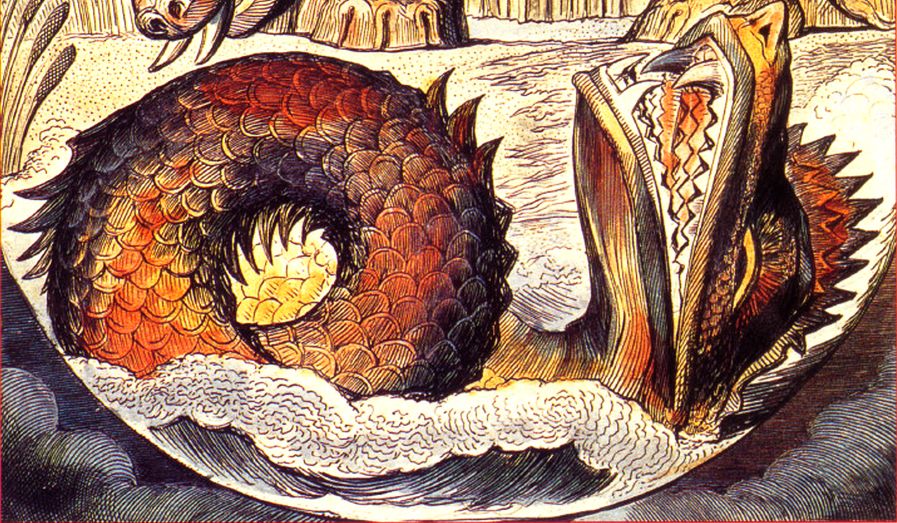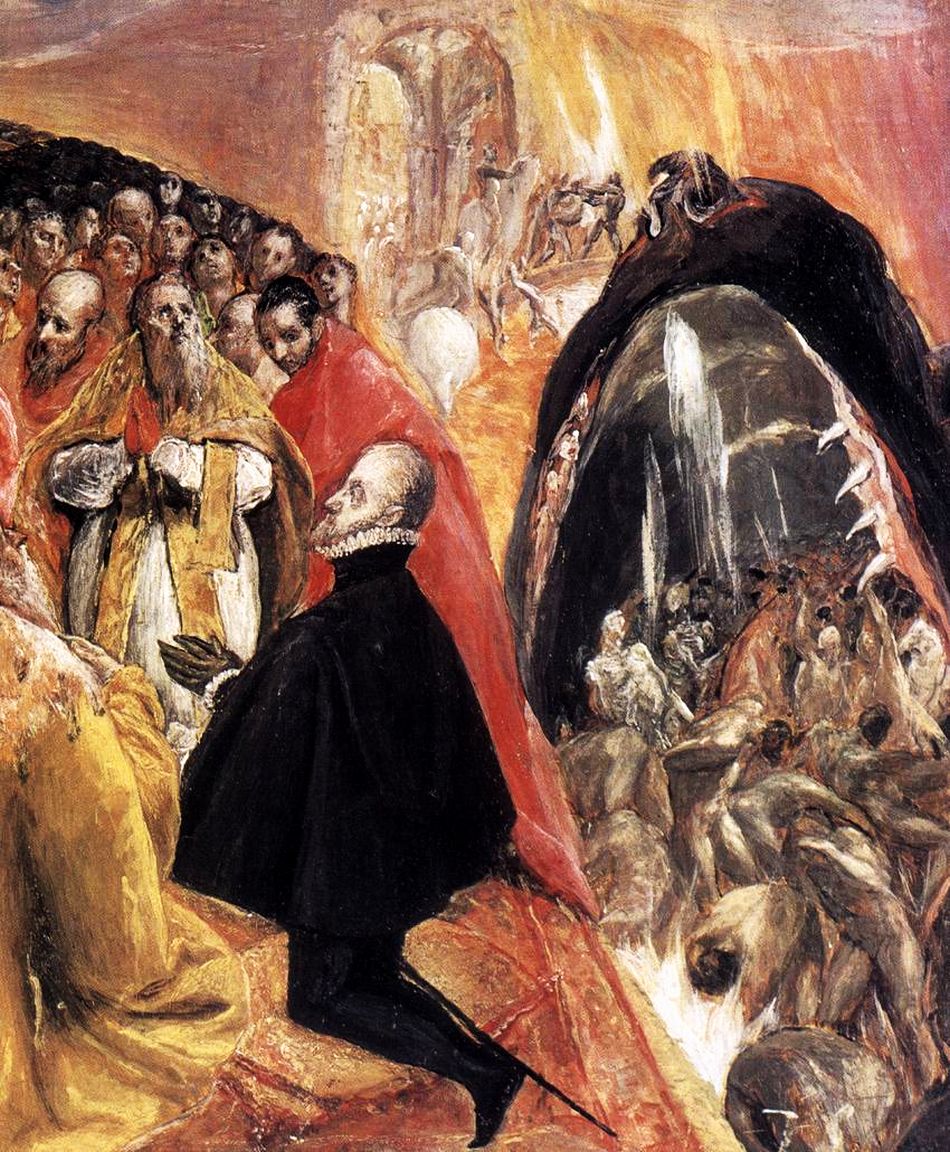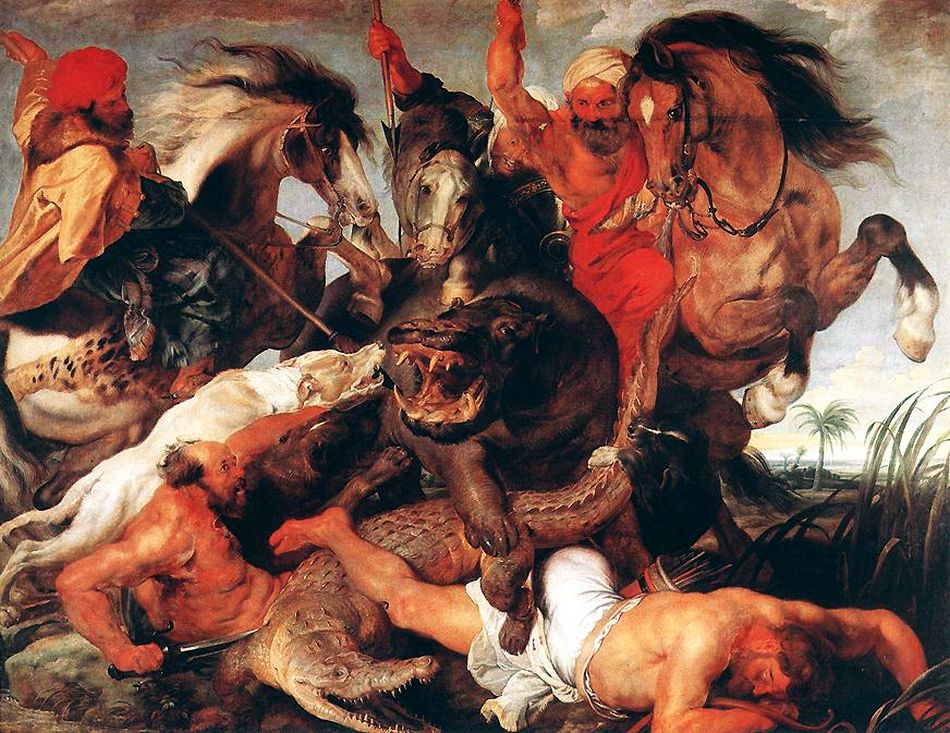DAWN
Daily Arts Web Nucleus
Discover the Arts! Each day a different image from the Literary, Performing, or Visual Arts representing a portion of Scripture plus an explanation with links 2015 January 31
Image 1: Leviathan: Detail from Behemoth and Leviathan, Butts Set (1805)
William Blake (1757-1827)
Romanticism Style
Morgan Library and Museum, New York, New York, USA
Image Source: Wikipedia
~~~~~~~~~~
Image 2: Leviathan: Detail from The Adoration of the Name of Jesus (1578-1580)
El Greco (1541-1614)
Spanish Renaissance Style; Plus Elements of Mannerism and the Venetian or Italian Renaissance
National Gallery, London, England, United Kingdom
Image Source: Web Gallery of Art
~~~~~~~~~~
Image 3: Hippopotamus and Crocodile Hunt (1615-1616)
Peter Paul Rubens (1577-1640)
Flemish Baroque Style; Antwerp School
Alte Pinakothek, Munich, Germany
Image Source: Web Gallery of Art
Explanation: In Job 41 the LORD continues to show Job how incapable his wisdom and power are of overthrowing God's judgment. The chapter draws lessons solely from Leviathan. The first image shows Leviathan as conceived by Blake in his famous drawing titled "Behemoth and Leviathan." The second image depicts Leviathan as a metaphor for Hell. The third image gives a realistic depiction of the hippopotamus and the crocodile, which many commentators believe are the animals described in chapters 40 and 41, respectively.
[ THEMATICALLY AND CHRONOLOGICALLY RELATED SCRIPTURES: Job 37. Job 38. Job 39. Job 40. Job 42. ]
[ CHRONOLOGY: General. Patriarchs (Traditional). Judges # 1. Judges # 2. Kings # 1. Kings # 2. Prophets # 1. Prophets # 2. NT # 1. NT # 2. NT # 3. ]
[ MAPS: Maps # 1. Maps # 2. Maps # 3. Maps # 4. Maps # 5. ]
The LORD asked Job if he could control Leviathan (the twisting one). Leviathan has been variously translated as a whale, a crocodile, or a mythical creature (such as the celestial dragon which eclipses the sun, or the world-encompassing serpent). Many commentators take it as a crocodile. This interpretation fits the idea that the "behemoth" or hippopotamus of the previous chapter is, perhaps, a companion animal in the Nile or other Near Eastern waters.
The LORD asks if Job could catch Leviathan with a hook, bind its tongue with a cord, put a hook in its nose, or bore through its jaw with a thorn (1-2). Will Leviathan plead with Job, asks the LORD? Or will he speak softly to Job, make a covenant with him, or be his servant forever (3-4)? He asks if Job could play with Leviathan as with a bird, make him a plaything for his maidens, make him the main course at a banquet, or sell him to the merchants (5-6). He asks Job if he could fill the skin of Leviathan with barbs or his head with fish spears (7-8). Then the LORD challenges Job to lay hands on Leviathan and do battle with him and he would never do it again; and he reminds Job that no one is so fierce that he dare stir him up or stand before him (9-10). The LORD than applies these lessons and asks Job who has first given to him that he should have to repay him, because everything under heaven is his (11).
The LORD then tells Job more about Leviathan. He speaks about the limbs, the strength, and the frame of the Leviathan (12). He asks Job who can strip off Leviathan's outer garment, or come near him with a bridal, or force his mouth open and risk being bitten by his teeth (14). His back is covered with closely sealed, airtight scales as strong as shields which cannot be separated from one another (15-17). "His sneezings flash forth light, and his eyes are like the eyelids of the dawn" (18). Poetically, the LORD describes Leviathan as breathing out flames, sparks, smoke, and coals (19-20). Leviathan's neck is strong; he is terrifying; his skin is firm and immovable; his heart is hard as stone (21-24). He frightens and terrifies even the mighty (25). Swords, spears, darts, and javelins are of no avail against him, even those made of iron or bronze. They are like rotten wood. The arrow cannot make him afraid; sling stones and clubs are like stubble. He laughs at javelins (26-29). His underparts are as sharp as potsherds; he is like a threshing sledge in the mire (30). He makes the deep boil like a pot and makes it look like a pot of ointment, or as if it were white-haired (31-32). No one on earth is fearless like him. He is "king over all the sons of pride" (33-34).
Job 41
1 Canst thou draw out leviathan with an hook? or his tongue with a cord which thou lettest down?
2 Canst thou put an hook into his nose? or bore his jaw through with a thorn?
3 Will he make many supplications unto thee? will he speak soft words unto thee?
4 Will he make a covenant with thee? wilt thou take him for a servant for ever?
5 Wilt thou play with him as with a bird? or wilt thou bind him for thy maidens?
6 Shall the companions make a banquet of him? shall they part him among the merchants?
7 Canst thou fill his skin with barbed irons? or his head with fish spears?
8 Lay thine hand upon him, remember the battle, do no more.
9 Behold, the hope of him is in vain: shall not one be cast down even at the sight of him?
10 None is so fierce that dare stir him up: who then is able to stand before me?
11 Who hath prevented me, that I should repay him? whatsoever is under the whole heaven is mine.
12 I will not conceal his parts, nor his power, nor his comely proportion.
13 Who can discover the face of his garment? or who can come to him with his double bridle?
14 Who can open the doors of his face? his teeth are terrible round about.
15 His scales are his pride, shut up together as with a close seal.
16 One is so near to another, that no air can come between them.
17 They are joined one to another, they stick together, that they cannot be sundered.
18 By his neesings a light doth shine, and his eyes are like the eyelids of the morning.
19 Out of his mouth go burning lamps, and sparks of fire leap out.
20 Out of his nostrils goeth smoke, as out of a seething pot or caldron.
21 His breath kindleth coals, and a flame goeth out of his mouth.
22 In his neck remaineth strength, and sorrow is turned into joy before him.
23 The flakes of his flesh are joined together: they are firm in themselves; they cannot be moved.
24 His heart is as firm as a stone; yea, as hard as a piece of the nether millstone.
25 When he raiseth up himself, the mighty are afraid: by reason of breakings they purify themselves.
26 The sword of him that layeth at him cannot hold: the spear, the dart, nor the habergeon.
27 He esteemeth iron as straw, and brass as rotten wood.
28 The arrow cannot make him flee: slingstones are turned with him into stubble.
29 Darts are counted as stubble: he laugheth at the shaking of a spear.
30 Sharp stones are under him: he spreadeth sharp pointed things upon the mire.
31 He maketh the deep to boil like a pot: he maketh the sea like a pot of ointment.
32 He maketh a path to shine after him; one would think the deep to be hoary.
33 Upon earth there is not his like, who is made without fear.
34 He beholdeth all high things: he is a king over all the children of pride.
ADDITIONAL AD LIB MATERIAL: Prose, Poetry, Writers, Visual Artists, Music, DAWN, and ILLUMINATION. ILLUMINATION features a compact, Illuminated Bible. DAWN, the page you are presently visiting, features a new image and explanation daily.
Please Email Comments and Questions To
AD LIB ARTS EMAIL
copyright 2014, Scott Souza
|


